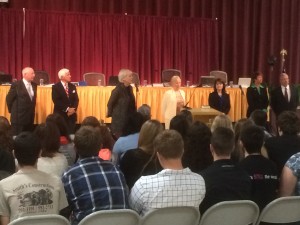News
Supreme Court Meets in Meigs County
By: Susan Tebben
Posted on:
Before discussing issues of juvenile detention, police public records documents and statutes of limitations on a rape case, the Ohio Supreme Court met with some of its youngest constituents at Meigs High School on Wednesday.
Multiple schools met at the high school to not only watch lawyers defend their positions on three cases before the state’s highest court, but also ask questions of Chief Justice Maureen O’Connor and the other justices about a career in law and the judicial system.
“They say the judicial system is the least understood, and I believe that 100 percent,” O’Connor said. “So, in order to enhance the understanding, and with understanding comes confidence in our judiciary, that’s why we do this.”

The justices conduct an off-site court proceeding on a rotating basis. Meigs County extended the invitation this time around.
A gymnasium full of students watched lawyers argue about a law mandating the transfer of certain juvenile cases to adult court. The case dealt with Matthew Aalim, who pleaded no contest to two counts of aggravated robbery and was sentenced to four years in prison in adult court, despite being 16 years old at the time of the offense. The issue before the court was whether the mandatory transfer of certain juveniles to adult court for certain crimes was constitutional.
Amanda Powell, a consultant for the National Juvenile Defender Center who argued Aalim’s case in front of the high court, said she enjoys the experience of presenting cases in front of a “sea of kids.”
“I always love it, because it makes all the issues, I feel, more palpable,” Powell said after court adjourned. “These are the kids who I’m fighting for, whether they know it or not.”
Justices also heard arguments for and against allowing “confidential law enforcement investigatory records” to be public record after a trial has concluded. The case stems from a suit from an attorney with the Ohio Innocence Project, who filed a public records request for a criminal case file from the Columbus Division of Police. The agency denied the request.
The third case before justices was an argument about a rape case in which the defendant was indicted nearly 20 years after the alleged rape occurred. Attorneys argued about the reasons for the delay in prosecution, including the fact that some potential witnesses in the case have now died.
Outside of legal debate, the justices told the Southeastern Ohio students to find a passion and look into a career in the judicial system, no matter where their interests lie. O’Connor said she started out believing she’d be an educator, Justice Judith French aspired to be a journalist, Justice Paul Pfeifer was a part of 4H when he began thinking of a career, and Justice William O’Neill was a registered nurse before going into law.
Justices Judith Lanzinger and Sharon Kennedy came from different backgrounds to make it to the top of the state judicial system. Kennedy spoke of her career as a police officer and the different paths she took to the bench.
“Whatever your passion is today, stay on that path, until you find that next fork in the road,” Kennedy told the students.
Lanzinger credited a cocktail party celebrating another lawyer for her introduction to law.
“I was the first one in my family to go to college, so I knew nothing about lawyers, I knew nothing about the law,” Lanzinger said.
The justice said partygoers encouraged her to go into law, despite her unrelated degree.
“All you need is a college degree,” she said, adding that the legal profession promotes strong writing skills, and brings out the confidence to argue for a cause.
The justices said being a lawyer doesn’t always mean facing off in a courtroom, but the skills have benefits in all parts of life.
“Lawyers help people solve problems that they haven’t been able to solve themselves,” O’Connor said.
Some students said they aspired to go to law school, but some simply enjoyed seeing a court that they normally only hear about from miles away.
“I thought it was an interesting experience for them to come out to Meigs County and such a small town be able to actually see something this big,” said Amber Holland, a junior at Eastern High School.

